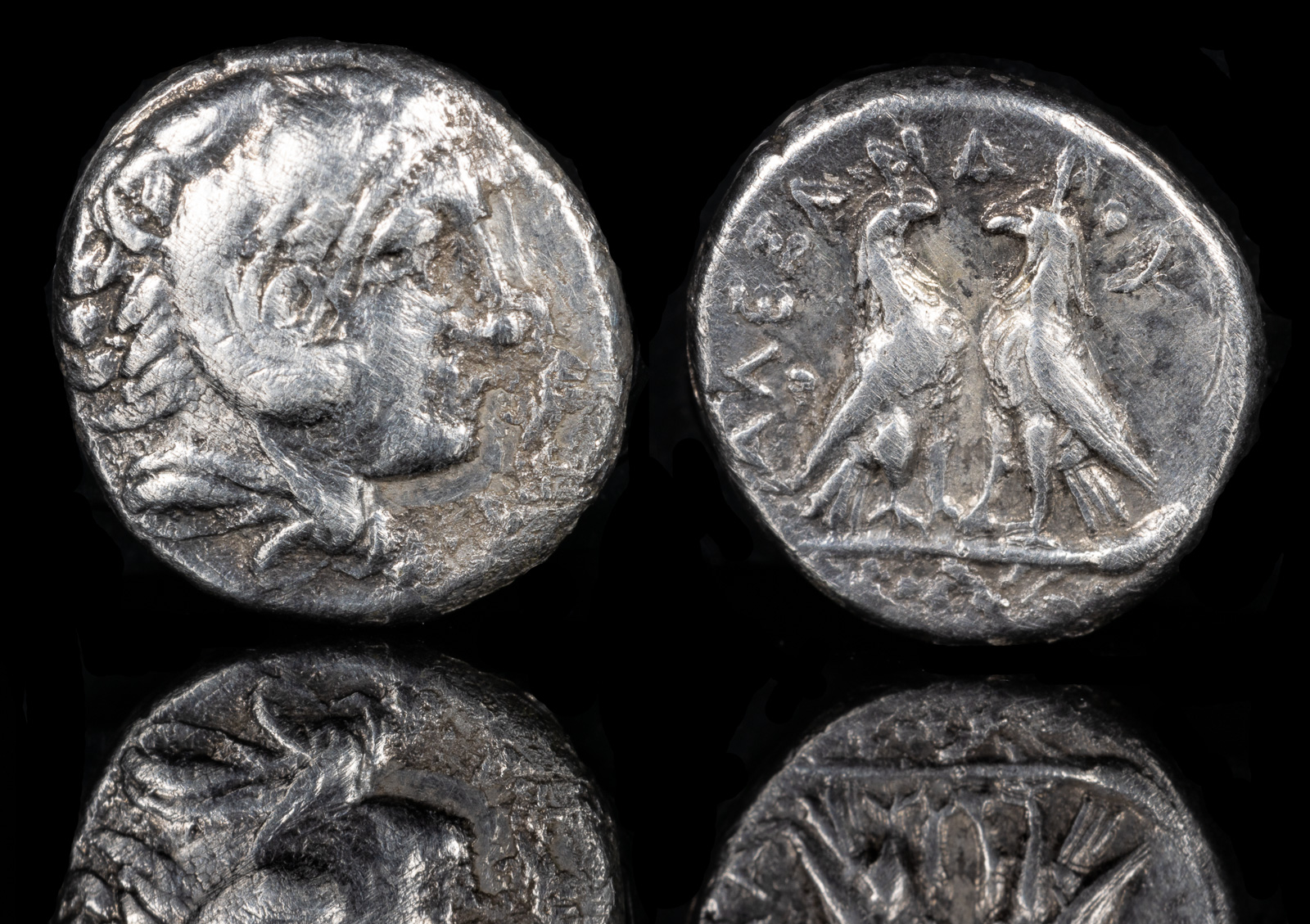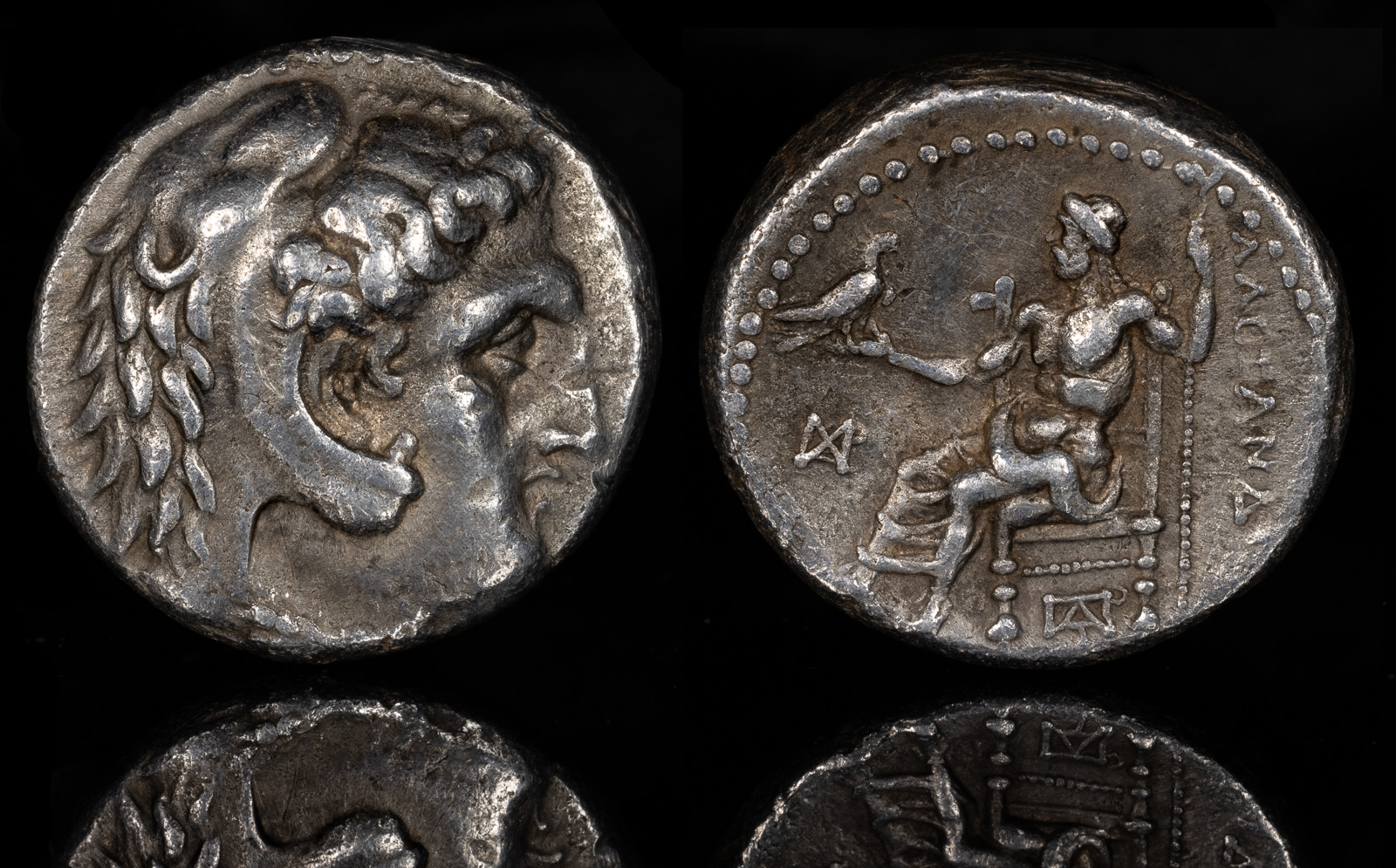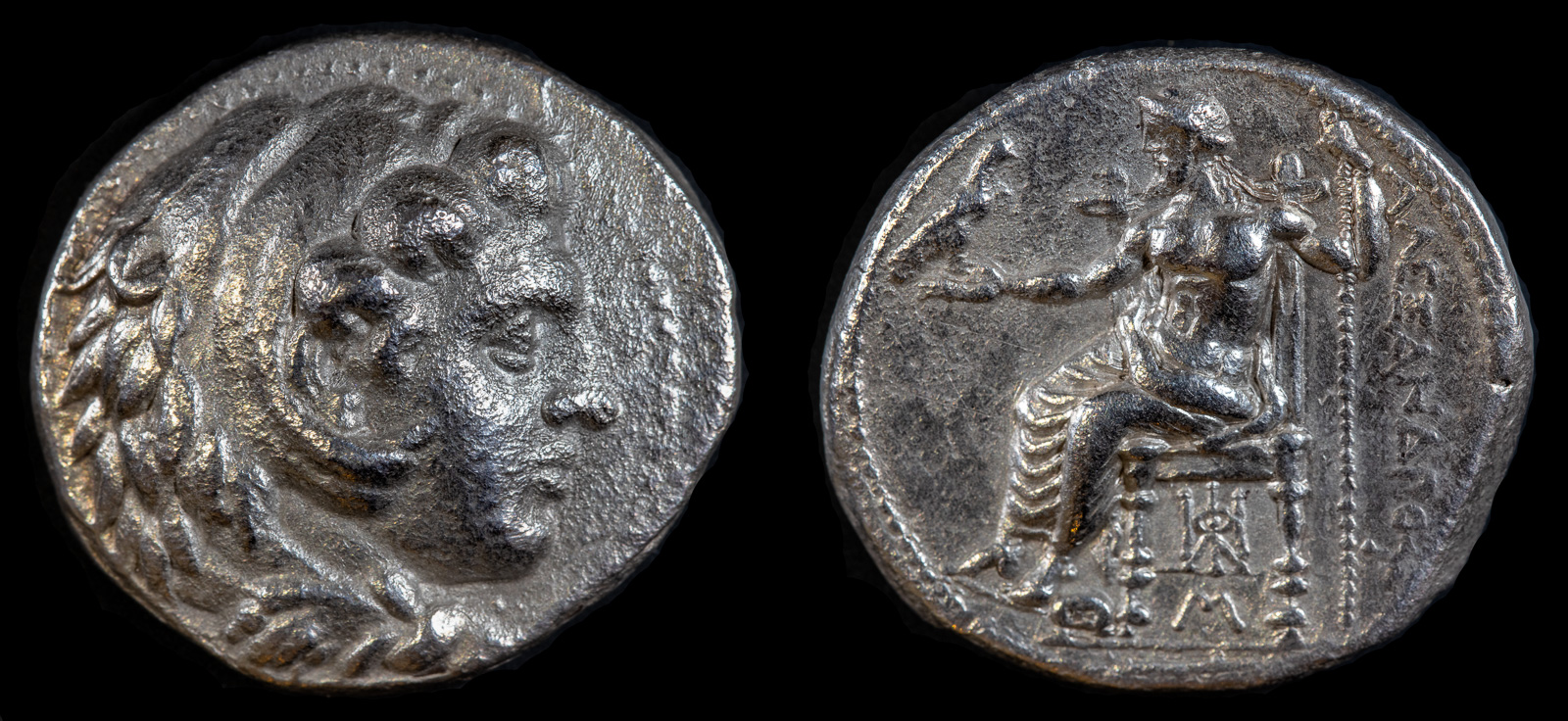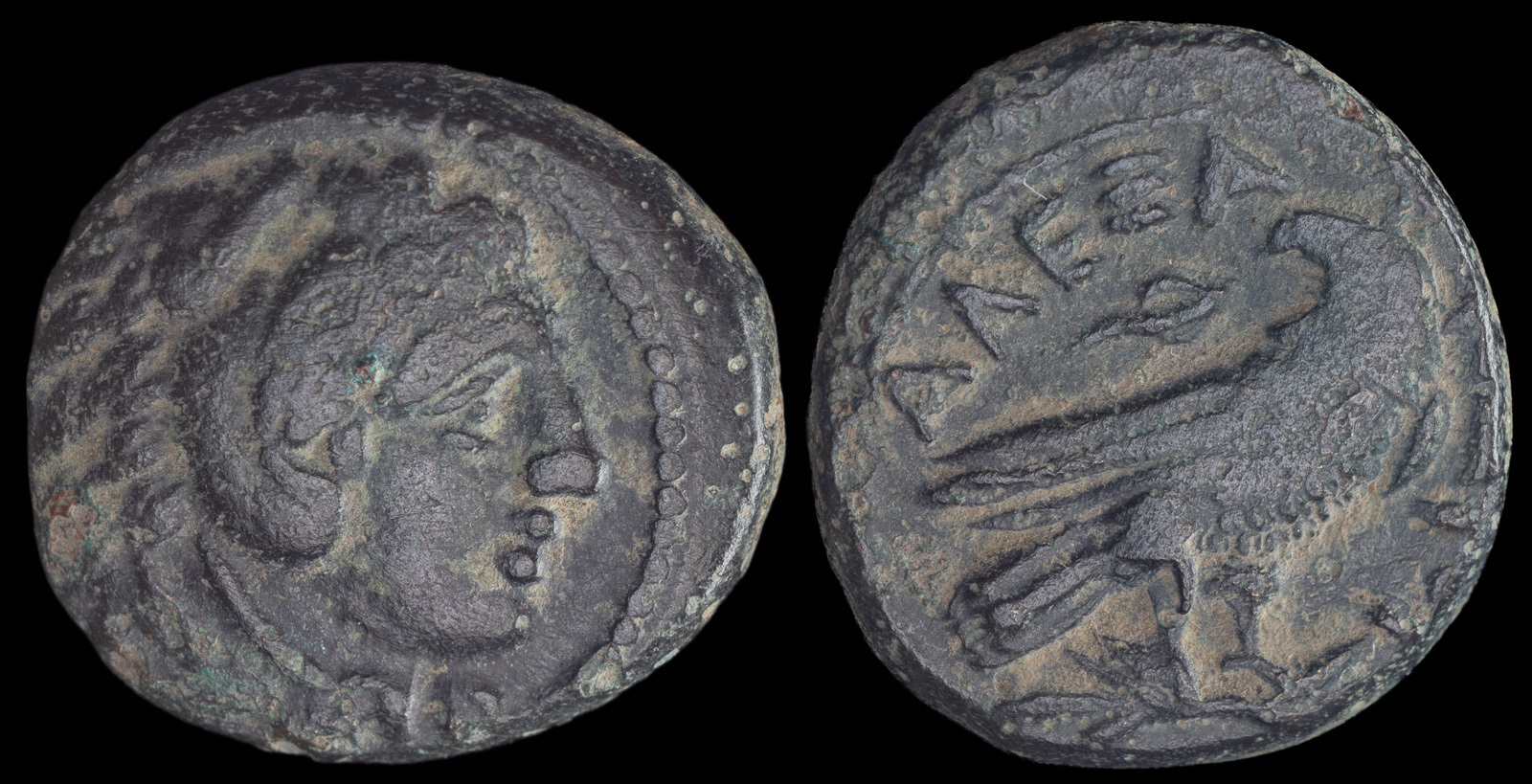
Alexander III ‘the Great’ AR Diobol
‘Amphipolis’, circa 336-323 BCE
Young head of Herakles to right, wearing lion skin headdress / ΑΛΕΞΑΝΔΡΟΥ, two eagles standing facing one another on thunderbolt.
Price 155; HGC 3.1, 906. 1.32g, 11mm, 3h.
What is there to say about perhaps the greatest general in history? Although he ruled a scant thirteen years, he was never defeated in battle and he managed to conquer half the known world, and some of the unknown. He took down the largest empire at the time, then moved into India. His empire had profound effects from Italy to India for hundreds of years after his death.
I’ve read more about Alexander the Great than I have of any other historical figure. He was a complicated person, beyond courageous in battle, kind to those he subjugated, but also quick to judgement. He led many attacks in the front line, and more than a few battle was won by his taking no heed to danger. Multiple times he was wounded and feared killed.
It must have been difficult, though, leading an army who worshipped him, but also who didn’t agree with many of his ideals. Alexander truly wanted a meshing of the world, while most of his soldiers just wanted booty. As his campaign became ever longer, conspiracies came out for his death, and by the end Alexander was truly paranoid. He had already killed several of his closest generals and friends, including Parmenion, Philotas, and Kleitos the Black.
When I first started collecting coins, a tetradrachm from Alexander’s lifetime was one of my top targets. It took some time to achieve, as they always attract attention, but finally I won one. I now own two tetradrachms, two drachms, two units, and a rare diobol from his lifetime.
True to form, his monetary system lasted in parts of Greece and Asia Minor until over two hundred years after his death. The city of Alexandria was named by him, and still stands as a great city in Egypt.
Other lifetime coins of Alexander the Great.

Alexander the Great
Tetradrachm AR 24 mm, 16.80 g, 7 h
Susa, struck under Koinos, circa 324-323 BCE.
Price 3829

Kingdom of Macedon, Alexander III ‘the Great’
AR Tetradrachm 16.68g, 27mm, 2h
Struck under Stamenes or Archon
Babylon, circa 324/3 BCE
Price 3599; Müller 670.

Kings of Macedon, Alexander III “the Great”
Amphipolis ca 330-323 BCE
Æ Half Unit 14,7mm, 4.40g
Head of Herakles r., wearing lion skin. R/ Eagle standing r., head l., on thunderbolt
Price 28
July 20
Alexander the Great is born in Pella, Macedon
Alexander the Great obtains the horse Bucephalus.
Alexander the Great begins tutoring with Aristotle.
Alexander drives the Maedi tribe from Macedonian territory while his father Philip II wages a campaign against the Thracians.
Alexander the Great flees Macedon after his father Philip II marries a woman whose heir could be a threat to his throne.
Pixodaros offers his daughter to Philip III Arrhidaios. Alexander the Great offers his hand instead and when Philip II hears about the matter, he calls it off.
Lysimachos is first appointed as a bodyguard of Alexander III along with Balakros.
October 25
Alexander the Great becomes King of Macedon when his father, Philip II, is murdered at the wedding of his sister Kleopatra and Alexander I Molossos. Perdikkas helps chase down and kill the assassin.
Alexander the Great puts down balkan revolts.
Alexander the Great demolishes Thebes after a rebellion. Perdikkas is severely wounded in the battle. Orchomenos and Thespiai fight on the side of Alexander.
Balakros becomes one of Alexander the Great’s seven bodyguards.
Odessos surrenders to Alexander III.
Orchomenos is rebuilt with the help of Alexander III.
Alexander the Great crosses from Sestos to Abydos. He then visits Troy and returns to Abydos. On his way, he sacrifices at the tomb of Achilles at Achilleion.
Alexander the Great visits the temple to Protesilaos at Elaios.
Parmenion, a general of Alexander the Great, takes Gryneion, burns it, and sells the inhabitants as slaves.
Alexander the Great besieges and eventually takes Halikarnassos, which is strongly defended by Memnon of Rhodes.
Antigonos Monophthalmos serves as commander of the allied infantry under Alexander the Great.
Antigonos is appointed satrap of Phrygia by Alexander the Great.
Alexander the Great departs for Persia and leaves Antipater as regent of Macedonia.
Alexander the Great appoints Asandros as satrap of Lydia.
Kalas appointed hipparch of the Thessalian cavalry by Alexander III.
Kalas assigned the satrapy of Hellespontine Phrygia by Alexander III.
Alexander the Great captures Kyzikos and commissions the effort to connect it to the mainland.
Menander is a commander of infantry under Alexander III.
Anaximenes supposedly tricks Alexander III into not destroying Lampsakos.
Alexander III attempts to take Myndos, but is repulsed.
Priapos surrenders to Panegoros, a general under Alexander III.
Alexander III takes Sardis and restores Lydian customs and laws.
Tralleis surrenders to Alexander III without incident.
May
The Battle of the Granicus, during which Alexander the Great defeated the Persians under Darius III, and after which Adramytteion and Kaunos come under his control. Kalas participates with the Thessalian cavalry under Parmenion. Perdikkas serves on the right.
May
Spithridates nearly kills Alexander III at the Battle of Granicus, but his arm is sheared off by Kleitos the Black before he can land the blow.
Alexander the Great conquers Cilicia and Pisidia, including Aigai.Tarsos (where he became ill after a swim in the Kydnos River), Soloi, Sagalassos, and Issos.
Alexander the Great captures Perge, then marches on to Aspendos. The inhabitants agree to taxes in exhange for being left alone, but as Alexander continues to Side and Sillyon, he learns that Aspendos did not ratify the taxes. Enraged, he turns his army around. Aspendos quickly surrenders, but this time Alexander gives them far harsher terms.
Exiles from Herakleia Pontika beg Alexander to remove Dionysios and restore their city to democracy. To protect his interests, Dionysios reaches out to Kleopatra, and on her behalf Alexander leaves him in place.
Balakros appointed satrap of Cilicia by Alexander the Great.
Alexander the Great arrives at Mallos, builds a bridge over the Pyramos, sacrifices to Amphilochos, and exempts it from paying taxes.
Polyperchon given command of the Tymphaean battalion by Alexander III.
Selge sends an embassy to Alexander III and obtains his friendship.
Alexander III fails to take Termessos.
Alexandria ad Issum founded by Alexander III.
April
Alexander III spends some time at Phaselis after its surrender.
November 5
Alexander the Great defeats Darius III at the Battle of Issos. Ptolemy I Soter serves on the left wing under Parmenion.
Sidon, Byblos, and Arados under Gerostratos submit to Alexander the Great as he travels through Phoenicia.
Alexander the Great besieges Gaza for five months before finally taking it. He is badly wounded in the head during the encounter. He resettles the city with Bedouins.
Alexander the Great enters Egypt, where he is hailed as a liberator. He sacrifices to the gods at Memphis.
Androkles of Amathos, Pnytagoras of Salamis, and Pasikrates of Kourion join Alexander the Great at the Siege of Tyre, where their qinqueremes are destroyed.
Alexander the Great completes the Siege of Tyre. 6000 soldiers are killed in the city, 2000 Tyrians are crucified on the beach, and 30,000 are sold into slavery. Their leader Azemilkos is pardoned but deposed. Gerostratos of Arados presumably plays a part.
Kleomenes of Naukratis made satrap of Egypt by Alexander III.
Menes is appointed a bodyguard of Alexander III along with Lysimachos.
Mazakes surrenders Egypt to Alexander the Great.
Nikokreon of Salamis and Pasikrates of Soloi pay homage to Alexander III in Phoenicia and take part in games.
Pnytagoras of Salamis is given Tamasos, previously the territory of Pumiathon of Kition, by Alexander the Great.
Methymna is recaptured by Hegelochos, general for Alexander III.
Alexander the Great sends an exploratory mission to the Arabian Peninsula while preparing for his campaign in Mesopotamia.
Alexander the Great enters Babylon after defeating Darius III at the Battle of Gaugamela.
Kyrene sends offers of friendship to Alexander the Great in Egypt, but do not come under Macedonian control.
Mazaios is ordered by Darius III to prevent Alexander III from crossing the Euphrates, but he doesn’t have the numbers to accomplish this.
Philoxenos supervises the collection of tribute for Alexander III in the territories north of the Taurus Mountains.
Alexander the Great visits the Oracle of Ammon in the Oasis of Siwa, where he is pronounced the son of Zeus. Ptolemy I Soter accompanies him.
Zopyrion, a general of Alexander III left in charge of Thrace, unsuccessfully attempts to take Olbia.
Samaria is destroyed by Alexander III.
Tenedos defects to Alexander III, but is then taken and its walls destroyed by Persia.
Tenedos is taken by Hegelochos, a general under Alexander III.
April
Alexandria, Egypt founded by Alexander the Great.
April
May
Alexander the Great leaves Egypt in pursuit of the Persians.
October 1
Alexander the Great defeats Darius III at the Battle of Gaugamela. Mazaios serves on the right flank of Darius.
October 21
326 BCE
Alexander the Great loots Persepolis.
Alexander the Great pardons Autophradates and restores honors to him.
Menander sends 2,600 Lydian infantry and 300 cavalry to Alexander III.
July
Alexander the Great stops at Hekatompylos.
July
Darius III is killed by his satrap Bessos and his body left for Alexander the Great to find.
Alexander the Great invades Baktria, defeating Bessus (the satrap of Bactria who declared himself king after Darius III’s death) and taking control of the region.
December
Alexander III is victorious at the Battle of the Persian Gate. The battalion of Perdikkas is crucial in the matter.
August
Alexandria Eschate founded by Alexander the Great as his furthest outpost.
Alexander marries Roxana, a Baktrian noblewoman, consolidating his control over the local elite and fortifying his hold on Baktria.
Ophellas commands a trireme on the Indus under Alexander III.
May
Alexander the Great defeats Poros at the Battle of the Hydaspes. His horse Bucephalus dies at its conclusion. Antigenes and Seleukos command hypaspists (special infantry) who cross the Hydaspes with Alexander.
The Silver Shields founded in India by Alexander the Great with Antigenes as their commander.
Alexander III appoints Peithon satrap of India.
Seuthes III revolts against Alexander III after his governor of Macedon, Zopyrion, is killed against the Getai.
Alexander the Great discharges wounded and elderly veterans at Opis, including Antigenes, Krateros, Polyperchon, and White Kleitos.
Alexander the Great orders Krateros to replace Antipater as regent of Macedonia.
Koinos arrives in Persia with mercenaries to support Alexander III.
Alexander the Great meets his admiral Nearchos at Susa.
October
Death of Hephaistion, the best friend and probable lover of Alexander the Great.
Alexander plans an expedition to Arabia to explore and possibly conquer parts of the peninsula, but dies before they leave.
Alexander III promises to look past the misbehavior of Kleomenes of Naukratis if he builds a large monument to Hephaistion.
Ptolemy I Soter marries the Persian Artakama at Susa as ordered by Alexander III.
June 11
Ptolemy diverts the funeral carriage of Alexander the Great to Alexandria. Archon may have colluded with him on this.